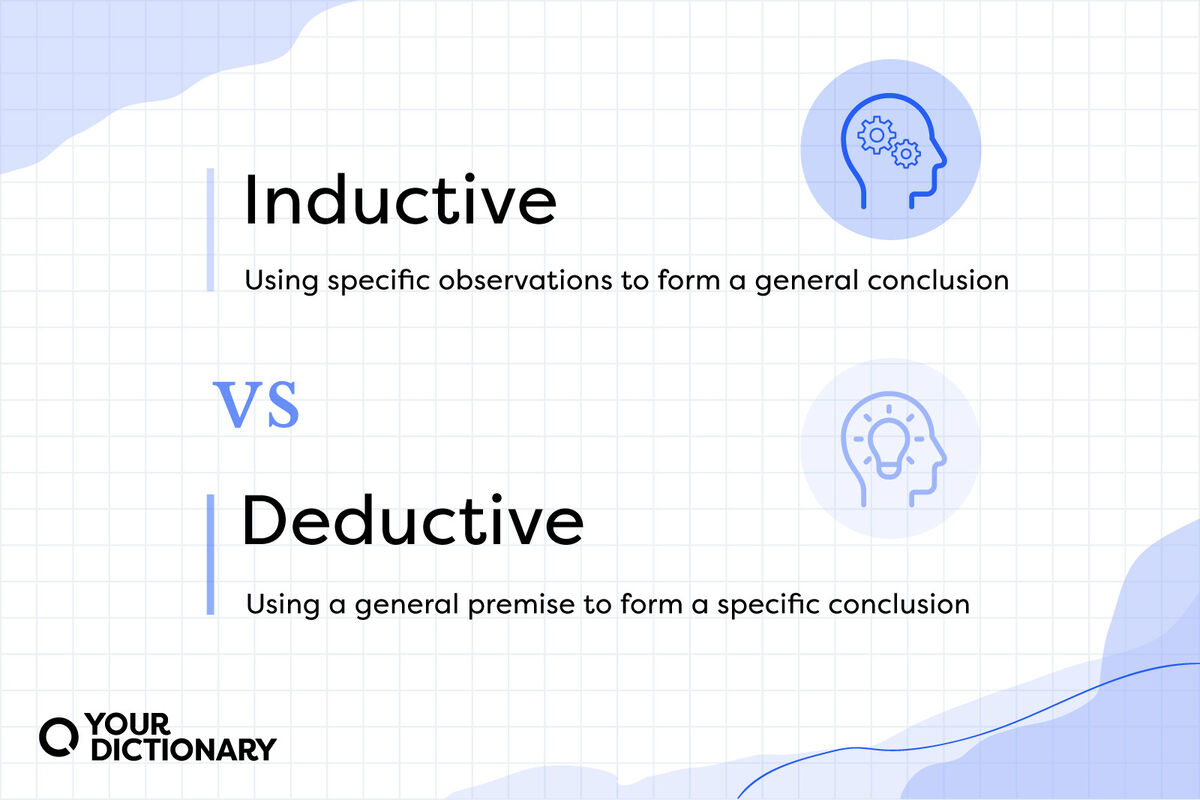
Sherlock Holmes was one of the greatest detectives in history (well, fictional detectives, anyway) whose astute power of deduction enabled him to solve a crime with time left over for tea with Watson. But you may be surprised to learn that Holmes’ famous conclusions weren’t always the result of deductive reasoning — in fact, they mostly came from inductive reasoning. So what’s the difference between inductive vs. deductive reasoning? It has more to do with grammar than even Sherlock Holmes himself may know.
Inductive: From Specific To General
Both inductive and deductive reasoning come from the Latin ducere, “to lead.” When paired with the prefix in- (“into”), ducere becomes inducere: “to lead into.” It refers to the process of inductive reasoning in which one observes specific details to “lead into” a more general conclusion. Inductive reasoning is similar to making inferences: forming a conclusion based on what you see.
Examples of Inductive Reasoning
You probably see examples of inductive reasoning every day. They may include:
- Someone broke into the neighbor’s house last night. This neighborhood is unsafe.
- The third grade class loved their pizza party. All third graders must love pizza parties.
- Teresa only won $1 when she bought a lottery ticket. All lottery tickets must only be worth $1.
- Whenever Kelly hires a political science major, they quit within a few months. All political science majors must be flaky.
- My baby sleeps through the night every night. All babies must be good sleepers.
When you use too few examples to prove a general conclusion, as in the examples above, you end up making hasty generalizations (also known as “jumping to conclusions”). Sherlock Holmes certainly used inductive reasoning when surveying a crime scene, but he used many pieces of evidence to arrive at his conclusions — making his reasoning valid.
Deductive: From General to Specific
With the prefix de- (“down”), the Latin ducere becomes deducere: “to lead down.” Deductive reasoning begins with a general premise, uses evidence to support or test that premise, and arrives at a logical conclusion. You’re likely to see deductive reasoning in logical syllogisms, which are three-part logical statements that use the pattern “If A means B, and B means C, then A means C.” You’ll also see deductive reasoning in any argument that seeks to prove a hypothesis, such as the scientific method.
Examples of Deductive Reasoning
Today, people often use the verb deduce to refer to any type of evidence-based reasoning that leads to a conclusion (often when they mean the word infer). But deductive reasoning is more specific than this common use. Examples of deductive reasoning include:
- All fish can swim. A trout is a fish. Therefore, a trout can swim.
- Scary movies give Arlo bad dreams. Carrie is a scary movie. Therefore, it gives Arlo bad dreams.
- Coffee from Starbucks is expensive. This latte is from Starbucks. Therefore, it was expensive.
- The scientists believe this drug will cure a genetic disease. They conduct experiments and collect data, which prove that the drug will cure the genetic disease.
- Teachers from our school believed that a later start to the school day would help student learning. After a month of trying a new schedule, they determined that students learn better when school starts later.
Unlike inductive reasoning, deductive reasoning validates itself within the actual argument. Unless the argument is faulty (known as a logical fallacy), deductive reasoning is an effective way to prove or disprove a premise or hypothesis.
Which One Is More Reliable?
If you work as quickly and have as much background knowledge as Sherlock Holmes, then inductive reasoning is probably pretty reliable for you. After all, it uses your observations to come up with a logical conclusion — and it’s valid as long as you have enough evidence.
However, if you need to take your time and prove a general premise before coming up with a conclusion, you’ll probably depend more on deductive reasoning. It’s not as open-ended as inductive reasoning, but with thorough consideration and review, your conclusion may hold more water than an inductive argument. (Just avoid those fallacious statements!)
Make Arguments Without Arguing
Looking for effective ways to prove your point in writing and speech? Check out: